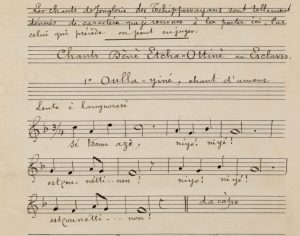Among the greatest blunders committed by ethnomusicologists when interacting with indigenous cultures is their notation of that culture’s music. The process that comes with this endeavor ends up having a pretty standard formula. A musicologist will learn their notation skills in higher education, become convinced that theirs is the best (typically the standard European notation practice), and then go on to apply it when “capturing” the music of other cultures. We of course all know the tales of Densmore and her blunders, but unfortunately her story is not very unique. Take for example this French Ethnomusicologist’s transcription of indigenous American “chants”.
1Similar to Densmore, very strange notation that we can only assume is a mere approximation of what was heard. This begs the question- if western notation is restrictive, why not employ other notation styles? Why not unmetered bars of music? Why not employ a number system for microtonal music? WHY DON’T OUR TAX DOLLARS GO TOWARDS MORE PUBLIC INFRASTRUCTURE? But seriously- did these musicologists have ideas of other forms of notation? I believe that there are many answers to why western notation was forced to merge with other cultures in violent ways. For one, a precedent was set by Densmore to use western notation and to not deviate so that it was easier for western scholars to consume. Secondly, I do believe that many scholars of the late 19th and early 20th century were certainly unaware of other forms of notation. They lived in a far less globalized and more isolated society, even in the most diverse and rich academic institutions of the time.
But our time is different. We must teach at least basic introductions into other forms of notation. If not just to spread music from different cultures in less violent and in more reliable ways, but to expand our own worldview and thought processes when listening and interacting with music from varying cultures in all situations we may encounter it. To fail to learn other systems of notation, is to fail other cultures in an increasingly global society.
Works Cited:
https://www.aihc.amdigital.co.uk/Documents/Images/Ayer_MS_715/2

